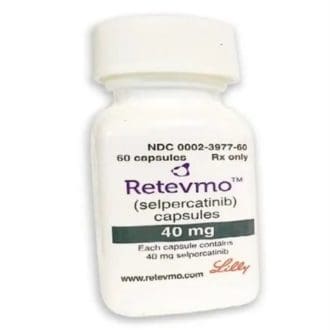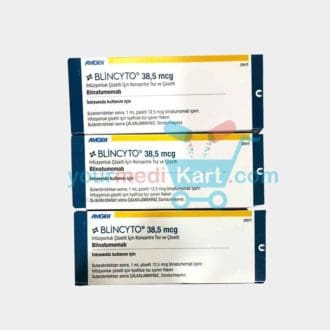Qinlock Ripretinib 50 mg price in india get best at Yourmedikart, used to treat certain types of a cancer called gastrointestinal stromal tumor. Qinlock may also be used for other conditions as determined by your health care provider.
- Brand Name(s): Qinlock
- Generic Name(s): Ripretinib
- Pronunciation: kin-lok, rip-RE-ti-nib
What is Qinlock Used For?
Qinlock (generic name: ripretinib) is a prescription medicine used to treat a rare type of cancer known as gastrointestinal stromal tumor (GIST). It is typically prescribed to adults who have already received treatment with three or more kinase inhibitor therapies, including imatinib, and whose cancer has either spread (metastasized) or cannot be surgically removed.
In some cases, Qinlock may be prescribed for other medical conditions at the discretion of your healthcare provider.
How Qinlock Works (Mechanism of Action)
Qinlock belongs to a class of cancer treatments known as tyrosine kinase inhibitors. It works by targeting and blocking abnormal forms of kinase proteins—enzymes that control cell functions like growth and division. In GIST, these proteins can mutate and become overactive, leading to uncontrolled tumor growth.
Qinlock is specially designed to inhibit multiple mutations of kinases, including KIT and PDGFRA, which are commonly involved in the progression of GIST. By blocking these faulty enzymes, Qinlock helps slow down or stop the growth of cancerous cells.
Dosage Form and Strength
Qinlock is available in the following formulation:
-
50 mg oral tablet
Each tablet is designed for once-daily oral administration.
Storage Instructions
To maintain the effectiveness and safety of Qinlock:
-
Store at room temperature between 68°F and 77°F (20°C and 25°C).
-
It can be temporarily exposed to temperatures between 59°F and 86°F (15°C and 30°C) during transportation.
-
Keep the bottle tightly closed and store in a cool, dry place.
-
Do not remove the desiccant packet inside the bottle. It helps protect the tablets from moisture.
-
Keep out of reach of children.
Common Side Effects
Like all medications, Qinlock may cause side effects. While not everyone will experience them, the most frequently reported side effects include:
-
Hair thinning or hair loss (alopecia)
-
Fatigue or general tiredness
-
Nausea or vomiting
-
Abdominal pain
-
Constipation
-
Muscle aches
-
Diarrhea
-
Reduced appetite
-
Hand-Foot Syndrome (redness, swelling, and pain on palms and soles)
Always notify your healthcare provider if these symptoms persist, worsen, or impact your daily activities.
Serious Side Effects
Though less common, Qinlock may lead to serious or potentially life-threatening side effects. Contact your healthcare provider immediately or seek emergency medical help if you experience any of the following:
Severe Allergic Reactions
-
Difficulty breathing or wheezing
-
Rapid heartbeat
-
Fever or feeling unwell
-
Swollen face, lips, mouth, tongue, or throat
-
Rash, hives, or itching
-
Dizziness or fainting
-
Nausea, vomiting, or stomach cramps
-
Joint pain
Hand-Foot Syndrome (Palmar-Plantar Erythrodysesthesia)
-
Red, swollen, blistered, or painful palms or soles
-
Skin bleeding, cracking, or peeling
-
Severe rashes
Skin Cancer
Qinlock may increase the risk of developing new skin cancers. Regular dermatologic checkups are essential while taking this medication. Watch for:
-
New or changing moles
-
Sores that do not heal
-
Raised or scaly lesions
-
Unusual skin changes
High Blood Pressure (Hypertension)
Qinlock may cause new or worsened high blood pressure. Monitor your blood pressure regularly and report:
-
Headaches
-
Chest pain
-
Dizziness or blurred vision
-
Anxiety or confusion
-
Nosebleeds
-
Ringing in the ears
-
Nausea or shortness of breath
Emergency Threshold: If your blood pressure exceeds 180/120 mm Hg, seek medical help immediately.
Heart Failure
In rare cases, Qinlock can lead to heart failure. Notify your provider if you experience:
-
Shortness of breath (especially when lying flat)
-
Swelling in the legs, feet, or abdomen
-
Rapid weight gain
-
Fatigue
-
Bulging neck veins
Wound Healing Problems
Qinlock can impair the body’s ability to heal wounds. Inform your doctor before any planned surgeries or if you have recent injuries.
Photosensitivity (Sun Sensitivity)
Qinlock can make your skin more sensitive to sunlight or artificial UV light (e.g., tanning beds, sunlamps). Protect your skin by:
-
Wearing protective clothing and wide-brimmed hats
-
Applying broad-spectrum sunscreen (SPF 30 or higher)
-
Avoiding sun exposure during peak hours
Seek help if you develop sunburn, blistering, or skin swelling after sun exposure.
Warnings and Precautions
Who Should NOT Take Qinlock
Avoid Qinlock if you are allergic to:
-
Ripretinib (active ingredient)
-
Any component of the Qinlock tablet
Your pharmacist or healthcare provider can provide a full list of ingredients if needed.
Important Usage Guidelines
-
Take exactly as prescribed by your healthcare provider.
-
Do not share your medication with anyone, even if they have the same condition.
-
Swallow tablets whole with water. Do not chew, crush, or split them.
-
Try to take Qinlock at the same time each day.
-
Use effective birth control during treatment and for at least one week after the last dose if you can father a child.
-
Qinlock may impact fertility. If you have concerns about your ability to conceive, speak with your doctor.
Before Starting Qinlock
Inform your doctor about:
-
All current health conditions and medical history
-
Any prescription or OTC medications you take
-
Vitamins, supplements, and herbal products
-
Any planned surgeries or dental procedures
-
Previous treatments for GIST or other cancers

Before Using Qinlock (Ripretinib)
🩺 What to Tell Your Healthcare Provider
Before starting Qinlock Ripretinib 50 mg, it’s important to have a thorough discussion with your healthcare provider. This helps ensure the medication is safe and effective for your unique health condition.
Be sure to share information about the following:
1. Your Medical History
Tell your doctor if you currently have, or have ever had, any of the following health issues:
-
Hand-Foot Syndrome (also called palmar-plantar erythrodysesthesia syndrome): Qinlock can worsen this skin condition.
-
High Blood Pressure (Hypertension): Qinlock may raise your blood pressure or worsen existing hypertension.
-
Heart Conditions: Including heart failure, irregular heartbeat, or other cardiovascular concerns.
-
Recent or Planned Surgery: Qinlock can interfere with wound healing, so your doctor should know about any scheduled surgical procedures.
2. Medications and Supplements
Qinlock may interact with a variety of medications, supplements, and herbal products. Tell your healthcare provider about all substances you are currently taking, including:
-
Prescription medications
-
Over the counter (OTC) drugs
-
Vitamins and minerals
-
Herbal supplements
These interactions could affect how Qinlock works or increase your risk of side effects. For more details, see the Drug Interactions section below.
3. Pregnancy and Family Planning
Qinlock can harm an unborn baby. You should not take it during pregnancy.
-
If you or your partner can become pregnant, use effective birth control while taking Qinlock and for at least 1 week after the final dose.
-
If you become pregnant, or suspect pregnancy, inform your doctor immediately.
-
Do not attempt to conceive while taking Qinlock.
4. Breastfeeding
-
Do not breastfeed while taking Qinlock and for at least 1 week after your last dose.
-
It is currently unknown if Qinlock passes into breast milk. Breastfeeding could expose your baby to the medication and cause serious harm.
Drug and Food Interactions with Qinlock Ripretinib 50 mg
🍽️ Does Qinlock Ripretinib 50 mg Interact with Food or Drink?
-
No known food or drink interactions have been identified.
-
You can take Qinlock with or without food.
-
There are no specific dietary restrictions while using this medication.
However, alcohol may affect your body’s ability to handle cancer treatment:
-
While occasional alcohol may be safe, heavy drinking can impair your immune system and may increase fatigue, a common side effect of Qinlock.
-
Talk to your doctor about your alcohol use to determine what’s safe for you.
Does Qinlock Interact with Other Medications?
Yes. Qinlock can interact with other drugs by affecting their metabolism in the liver, particularly those processed by the CYP3A enzyme system. These interactions may:
-
Decrease the effectiveness of Qinlock
-
Increase the risk of side effects
-
Alter blood levels of either Qinlock or the other medicine
Always provide your healthcare provider with an updated list of all medications and supplements, including anything you’ve taken in the past few weeks.







